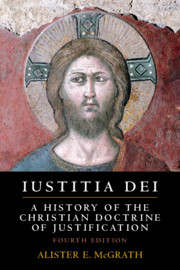Book contents
- Iustitia Dei
- Iustitia Dei
- Copyright page
- Contents
- Tables
- Preface to the Fourth Edition
- Abbreviations
- Introduction
- Part I Justification
- Part II The Middle Ages
- Part III Protestantism
- Part IV Catholicism
- Part V The Modern Period
- 27 The Enlightenment
- 28 The Long Nineteenth Century
- 29 Contemporary Renewal
- Conclusion
- A Brief Glossary of Medieval Soteriological Terms
- Works Consulted
- Index
29 - Contemporary Renewal
Justification and Theological Reconstruction
from Part V - The Modern Period
Published online by Cambridge University Press: 27 January 2020
- Iustitia Dei
- Iustitia Dei
- Copyright page
- Contents
- Tables
- Preface to the Fourth Edition
- Abbreviations
- Introduction
- Part I Justification
- Part II The Middle Ages
- Part III Protestantism
- Part IV Catholicism
- Part V The Modern Period
- 27 The Enlightenment
- 28 The Long Nineteenth Century
- 29 Contemporary Renewal
- Conclusion
- A Brief Glossary of Medieval Soteriological Terms
- Works Consulted
- Index
Summary
Chapter 29 concludes this study on the development of the doctrine of justification by considering how the doctrine has been explored and expressed since the end of the First World War. The chapter opens by considering Karl Barth and Dialectical Theology, a movement of theological reconstruction and retrieval, and notes the place of the doctrine of justification within this movement, especially in the writings of Barth and Emil Brunner. The analysis then shifts to the growing interest in retrieving the existential and affective aspects of justification, particularly in response to Martin Heidegger’s Sein und Zeit (‘Being and Time’, 1927). This is followed by a discussion of the retrieval of justification as a viable theological concept in recent theological writings. Writers such as Robert Jenson, Robert Kolb, Thomas F. Torrance, Michael S. Horton and Kathryn Tanner have shown how justification remains a significant theme in modern theological reflection, despite earlier suggestions that the concept was trapped in the theological past. Finally, the work reflects on discussions of justification in recent Pauline scholarship, particularly the ‘New Perspective on Paul’, and its role in the major ecumenical dialogues of the late twentieth century. The work concludes by expressing cautious optimism for the future of justification as a viable theological category.
Keywords
- Type
- Chapter
- Information
- Iustitia DeiA History of the Christian Doctrine of Justification, pp. 377 - 413Publisher: Cambridge University PressPrint publication year: 2020

